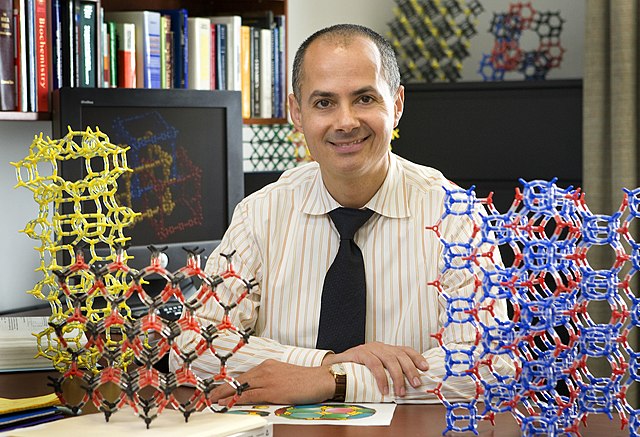Covalent organic framework
Covalent organic frameworks (COFs) are a class of porous polymers that form two- or three-dimensional structures through reactions between organic precursors resulting in strong, covalent bonds to afford porous, stable, and crystalline materials. COFs emerged as a field from the overarching domain of organic materials as researchers optimized both synthetic control and precursor selection. These improvements to coordination chemistry enabled non-porous and amorphous organic materials such as organic polymers to advance into the construction of porous, crystalline materials with rigid structures that granted exceptional material stability in a wide range of solvents and conditions. Through the development of reticular chemistry, precise synthetic control was achieved and resulted in ordered, nano-porous structures with highly preferential structural orientation and properties which could be synergistically enhanced and amplified. With judicious selection of COF secondary building units (SBUs), or precursors, the final structure could be predetermined, and modified with exceptional control enabling fine-tuning of emergent properties. This level of control facilitates the COF material to be designed, synthesized, and utilized in various applications, many times with metrics on scale or surpassing that of the current state-of-the-art approaches.

COF topological control through judicious selection of precursors that result in bonding directionality in the final resulting network. Adapted from Jiang and coworkers' Two- and Three-dimensional Covalent Organic Frameworks (COFs).
Reversible reactions for COF formation featuring boron to form a variety of linkages (boronate, boroxine, and borazine).
Reversible reactions for COF formation featuring nitrogen to form a variety of linkages (imine, hydrazone, azine, squaraine, phenazine, imide, triazine).
Reversible reactions for COF formation featuring a variety of atoms to form different linkages (a double stage connecting boronate ester and imine linkages, alkene, silicate, nitroso).
Omar M. Yaghi is the James and Neeltje Tretter Chair Professor of Chemistry at the University of California, Berkeley, an affiliate scientist at Lawrence Berkeley National Laboratory, the Founding Director of the Berkeley Global Science Institute, and an elected member of the US National Academy of Sciences as well as the German National Academy of Sciences Leopoldina.
Yaghi in 2008





